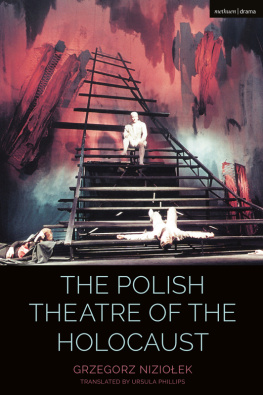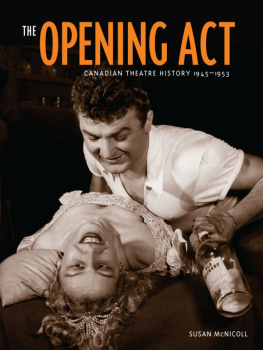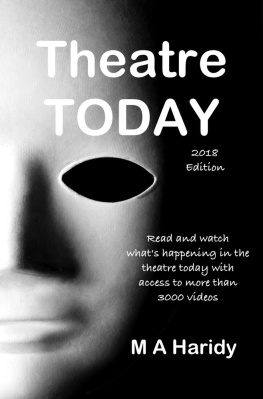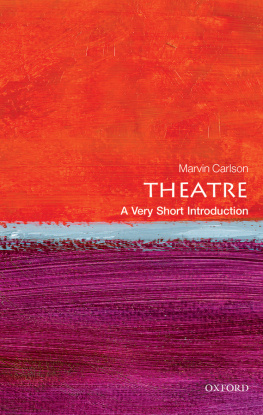The Polish Theatre
of the Holocaust
CULTURAL HISTORIES OF THEATRE AND PERFORMANCE
The Bloomsbury series of Cultural Histories of Theatre and Performance recognizes that historical knowledge has always been contested and revised. Since the turn of the twenty-first century, the transformation of conventional understandings of culture created through new political realities and communication technologies, together with paradigm shifts in anthropology, psychology and other cognate fields, has challenged established methodologies and ways of thinking about how we do history. The series embraces volumes that take on those challenges, while enlarging notions of theatre and performance through the representation of the lived experience of past performance makers and spectators. The series aim is to be both inclusive and expansive, including studies on topics that range temporally and spatially, from the locally specific to the intercultural and transnational.
Series editors:
Claire Cochrane (University of Worcester, UK)
Bruce McConachie (University of Pittsburgh, USA)
George Farquhar: A Migrant Life Reversed
David Roberts
Forthcoming titles
Alternative Comedy: 1979 and the Reinvention of British Stand-Up
Oliver Double
A Century of South African Theatre
Loren Kruger
The Polish Theatre
of the Holocaust
Grzegorz Nizioek
Translated by Ursula Phillips

Introduction
Chapter 1
Chapter 4
Chapter 6
Chapter 7
Chapter 8
Chapter 9
Chapter 10
A book such as this, covering many topics, people, places and times, is not created in a vacuum. It benefits from a multitude of inspirations and suggestions, sometimes pursuing and developing an idea initiated by someone else. It incurs debts that cannot be repaid. It is simply not possible to capture in one place all the stimuli and pointers I received from others during the creation of this work.
First of all, I would like to thank Piotr Gruszczyski and Krzysztof Warlikowski for their invitation to deliver a series of lectures on Polish theatre entitled The Holocaust in a Brave New World in 2009 and 2010. The first draft of this book emerged from these lectures. The audiences also proved to be a great support: loyally accompanying me, responding with animation and willingly engaging in further discussion. Their reactions convinced me that it was worth continuing my research into this topic.
During the course of writing this book, I received constant and dedicated support from Leszek Kolankiewicz, Joanna Krakowska and Piotr Mitzner.
I am grateful to Maria Bardini for giving me permission to look at the family archive of Aleksander Bardini, located in the Warsaw University Library. The late Anna Halczak gave me access to many valuable materials relating to Tadeusz Kantor. I would also like to thank Maria Dworakowska of the Theatre Institute in Warsaw, Magorzata Paluch-Cybulska of the Cricoteka Archive and Bruno Chojak of the Grotowski Institute for their kind assistance and unfailing advice. Thanks are due likewise to Jadwiga Adamowicz of the Contemporary Theatre in Warsaw, Magdalena Jaracz of the Gustaw Holoubek Dramatic Theatre in Warsaw, Maria Klotzer of the Peoples Theatre in Nowa Huta, Micha Smolis of the National Theatre, Adam Wyyski of National Film Archive and Mateusz urawski of the Studio Theatre, Warsaw. I am especially grateful to Jerzy Karpiski of the Theatre Institute for allowing me access to film materials relating to the work of Jerzy Grzegorzewski and Jzef Szajna, and to Pawe Poski for suggesting some intriguing leads. Danuta mij-Zieliska not only lent me her only copy of her translation of Rolf Hochhuths The Deputy, but also shared with me her knowledge of the circumstances surrounding the plays Warsaw premiere.
The Andrzej Wajda Archive was a place full of treasures. I am most grateful to the late Andrzej Wajda and to Krystyna Zachwatowicz for allowing me access to these materials, and to Bogdana Pilichowska for her professional care during my research.
During the preparation of the manuscript for the original Polish publication of this book, I had the good fortune to work with a number of people who demonstrated both their professional commitment and individual engagement. I am grateful to Dorota Buchwald, Magdalena Jankowska and Monika Krawul for their careful reading of the text. I also thank Dorota Kubica for her invaluable assistance in selecting the illustrative material, as well as Iwona Kurz of the Institute of Polish Culture at the University of Warsaw, who also advised on this matter. Many thanks also to Rafa Benedek for the overall design of the book.
All expressions of thanks seem too conventional in relation to the debt I owe to Agata Adamiecka-Sitek, who took charge of my project even at a very early stage of its realization. She was the first and the most attentive and critical reader of the book. She inspired its ultimate form in terms of both content and design, and approached all stages of the publication process with energy, consistency and faith in the value of the whole undertaking.
The most important thing is to realize that everything was visible, that it really did take place and that everyone saw at least a fraction of what was going on.
In his book Modernity and the Holocaust (1989) Zygmunt Bauman posed the question as to whether sociology, as a science that grew out of the Enlightenment project of modernization, was capable of contributing anything substantial to our knowledge of the Holocaust. Is it not blind to the Holocaust? As a product of Enlightenment rationalism, is it not disposed to constantly confirm the same old belief in social progress and humanitys ability to morally perfect itself on the road to improving social organization, and by the same token to treat the Holocaust solely as an aberration and act of barbarism, which can be counteracted morally, politically and ideologically? In this way, sociology seems to protect the dogmas of humanism which the Holocaust, through the very fact of its existence, has violently destroyed. Bauman proposed, as we recall, a radical change of perspective. The Holocaust is not, in his opinion, the defeat of modernizing social projects, but an integral part of them, arising out of the same notions and capable of realization on a massive scale, thanks to models of functionality and productivity inculcated in daily social practice, and which are inseparably linked to ideologies of modernity. Sociologists researching the Holocaust must therefore reassess the assumptions of their field of study, re-examine and challenge its conditionings and dogmas. Sociology does not teach us about the Holocaust, but learns from the Holocaust, as Bauman emphatically repeats.
His conclusions, somewhat reformulated, I attempt to apply to theatre. Must not forms of theatre originating in Enlightenment educational projects and Romantic national ideologies (as well as procedures created within this framework) become, by their very nature, instruments for practising defensive strategies, both social and individual, when faced by an experience such as the Holocaust? Are practices elaborated in Polish theatrical institutions regarding the initiation of performances, construction of identity (based on the exclusion of the other) and the establishment of a relationship with an audience (treated here as part of the common community) genuinely able to measure human experiences, which have isolated different social groups from one another and, as Jerzy Jedlicki suggests, set the bar of empathy very high? Has not Polish theatre therefore become, on account of its traditions, fervently harnessed to participating in ideological projects that deny memory of a too painful past? And in the same way, has not theatre become similarly to sociology in Baumans critique blind to the Holocaust? In the current book, drawing on many examples, I analyse the conditions causing this blindness, although I devote most space to analysing cases of poor eyesight (yet
Next page






